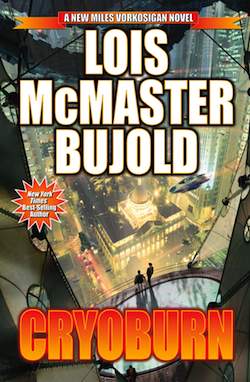This week we’re looking at the 2011 Hugo Nominees for Best Novel. You’ll be able to find all the posts in this ongoing series here.
Cryoburn is the eleventh book to star everyone’s favourite hyperactive little dwarf, Miles Naismith Vorkosigan. With an eight-year gap between it and 2002’s Diplomatic Immunity, those of us who are Miles fans may have been anticipating its publication with rather more eagerness than is entirely decorous. (Not that I’m admitting to anything, you understand. Certainly not anything indecorous.)
The novel opens very much in medias res, with Miles alone and hallucinating after having escaped an abduction attempt at a cryogenics conference on the planet Kibou-daini. Miles being Miles (if some years older than when last we knew him), this interests him far more than it disturbs him. Before long he has encountered Jin, a local eleven-year-old who proves important to the narrative, and got himself on the trail of a series of events which will have far-reaching consequences.
Kibou-daini is a planet ruled by the cryo-corps. Due to local laws, the vast conglomerates hold the voting proxies of the frozen people in their basements, and one of them, WhiteChrys Cryocorp, is attempting to expand to Komarr. Miles’s presence on Kibou-daini has come about because something about the planned expansion doesn’t smell exactly right. So being Gregor’s right-hand troubleshooter, he has been sent off to shoot trouble.
Somewhat more trouble than he’d originally bargained for, but once Miles meets Jin and starts poking his nose into corners in a typically Milesian way, that’s probably inevitable.
Jin is one of the best things about this book. He’s very perfectly eleven, with an eleven-year-old’s obsession with animals—he has a small menagerie of hens, rats, a three-legged cat and other assorted creatures—and a penchant for collecting strays. This last is how he ends up bringing Miles home. He lives on the roof of a disused (officially) building which houses a collection of Kibou-daini’s dispossessed and unwanted, a cryogenic co-operative, freezing people off the grid as a quiet form of civil protest.
As Miles investigates, we learn that Jin’s mother, Lisa Sato, was—or is: the proper verb tense for the frozen-not-exactly dead rather confuses me, I must admit—a cryo rights activist who has been frozen by the government in what appear to be suspicious circumstances—a dubious diagnosis of mental illness, for which she’s been frozen to await a ‘cure’. To Miles, this is like a red rag to a bull, and hereafter follow assorted capers, kidnappings, attempted arsons, corporate cover-ups, and takeovers, watched by the increasingly bemused and resigned Barrayaran ambassador, Vorlynkin (who is made of quite a large amount of win). Both Jin and the long-suffering but tolerant Armsman Roic share point-of-view with Miles, and it is interesting to see the different views each has of him.
We also get some old friends turning up during the course of events, like Raven Durona—who appeared in Mirror Dance—Lord Mark, and Kareen Koudelka.
Despite the fact that, to me, the endgame felt rushed and incomplete, Cryoburn is a perfectly cromulent little book. Its themes of mortality and the fear thereof mesh well with the character and concerns of an older Miles, and while Cryoburn possess both action and humour, its central focus on a political mystery and on Jin Sato, his younger sister and their mother, keeps the spotlight relatively personal.
It has some flaws. The Japanese flavour of Kibou-daini society can feel a little shallow. And compared to the likes of Memory or Mirror Dance or Brothers in Arms—or even Komarr—Cryoburn, up until the wrenching epilogue, is not rolling up its sleeves and getting its emotional hands dirty. It’s very much a series book, which works best in the context of pre-existing investment in Miles.
It’s not the strongest book in the series. In many ways, it’s a book that plays the safe option, and it’s less a book about Miles than one through which Miles passes. That’s perhaps my greatest complaint. Kibou-daini doesn’t matter to Miles the same way Barrayar or Komarr does, and at this point in his life, Miles doesn’t have a lot left to prove—to himself, or to anybody else, including the reader.
Although it’s not the best thing I read in 2010—and not, in my opinion, the best of the Hugo Award nominees this year—it is a good book, and a damn entertaining one.
Liz Bourke is a lifelong reader of SFF who is presently reading for a postgraduate degree in Classics at Trinity College, Dublin. She also reviews for Ideomancer.com.










